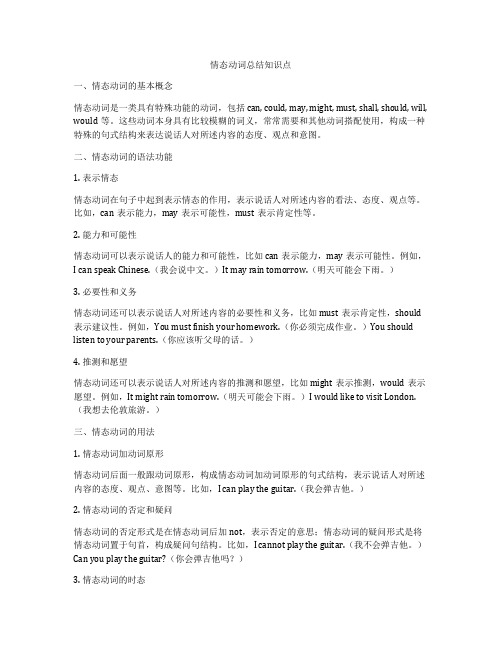高考情态动词复习(详细易懂)
- 格式:ppt
- 大小:590.00 KB
- 文档页数:44

情态动词归纳表情态V词义&用法注意事项特殊用法can could 1.表具备某种能力Can表现在能力;Could表示过去能力.可用be able to代替;was/were able to to表示成功做了某事(1)表惊异、怀疑、不相信、不耐烦等。
(此意常用于否定句、疑问句或惊叹句语气)Can/Could this be true?(2)can not…too\enough表示"无论怎样``````也不过分","越``````越好":You can't be too careful.2.表请求和允许①请求用could 语气委婉②允许不用could.3.表“可能性”①can用于否定和疑问句(could不限)②can (be)表示有时候会(常与sometimes, at times 连用)may might 1.表请求和允许①请求用might语气更委婉。
②允许时用may,表示“可以”(表示允许时不用might)。
(1)may/might well+V原形:表"完全可能,,很可能"= be very likely to:He maywell be proud for his son.(2)may/might as well+V原形:"最好,满可以,倒不如"You may as well stay here over night.2.表可能性“也许”此意常用于肯定句。
(might可能最小)3表祝愿固定句型为“May+主语+V原型”:May you succeed!must 1.表“必须”①must多表主观、现在/将来义务;have to多表客观、过去义务②mustn't表"禁止";否定用needn't /don't have to(1)表示必然结果:All men must die.人固有一死。

情态动词高中知识点高三情态动词是一类具有特殊意义和用法的动词,它们在句子中一般与实义动词连用,表示说话人的推测、命令、请求、建议等情态。
在高中英语学习中,掌握情态动词的正确用法至关重要。
本文将介绍情态动词的相关知识点,帮助高三学生更好地运用这一语法现象。
一、情态动词的定义情态动词,又称情态助动词,是用来表示说话人对某种动作或状态的态度、推测、可能性、能力、意愿、义务等情态的一类特殊动词。
常见的情态动词包括can、could、may、might、must、shall、should、will、would等。
二、情态动词的用法1. 表示能力情态动词can表示某人具有能力或可能做某事,could用于过去说法。
例如:- She can speak three languages fluently.(她能说流利的三种语言)- He could lift the heavy boxes when he was younger.(他年轻时能搬起这些沉重的箱子)2. 表示推测和可能性情态动词may、might、could用于表示推测和可能性。
may用于表示较为肯定的推测,might和could表示推测的可能性较小。
例如:- The weather is cloudy, it may rain later.(天气多云,可能会下雨)- He might be late for the meeting.(他可能会迟到会议)3. 表示义务和建议情态动词must表示说话人对某种行为具有强烈的责任感或坚决要求,should表示建议。
例如:- We must obey the laws of the country.(我们必须遵守国家的法律)- You should apologize to your friend for your mistake.(你应该为你的错误向朋友道歉)4. 表示许可和请求情态动词can、may、could用于表示允许和请求。


高考情态动词重点讲解高考情态动词重点讲解 (一) 情态动词的语法特征情态动词主要有can, may, must, could, might, shall , should, will, would, ought to, need, dare等。
1) 情态动词不能表示正在发生或已经发生的事情,只表示期待或估计某事的发生。
2) 情态动词除ought 和have 外,后面只能接不带to 的不定式,即动词原形。
3) 情态动词没有人称,数的变化,即情态动词第三人称单数不加-s。
4) 情态动词没有非谓语形式,即没有不定式,分词等形式。
(二) 情态动词表推测1. 形式肯定的推测:must否定的推测:can’t couldn’t可能的推测:may might can could疑问的推测:can could2. 时间对过去:情态动词+完成式(have done\have been done)对正在进行:情态动词+be doing对现在或将来:情态动词+do不同的“肯定”程度可按下列层次排列:He is at home. (事实)He must be at home.(非常肯定的推断)He could be at home.(很可能)He ought to be at home.(很可能)He may be at home.(仅仅可能而已)He might be at home.(或许, 非常不确定)He might not be at home.(也许不在家)He may not be at home. (比might可能)He couldn’t be at home.(很可能不在家)He can’t be at hom e.(一定不在家)He isn't at home.(事实)(三) 高考常用情态动词辨析1. can\ could\ be able to表示能力can和be able to都表示能力(Ability),意思上没多大区别。

情态动词总结知识点一、情态动词的基本概念情态动词是一类具有特殊功能的动词,包括can, could, may, might, must, shall, should, will, would等。
这些动词本身具有比较模糊的词义,常常需要和其他动词搭配使用,构成一种特殊的句式结构来表达说话人对所述内容的态度、观点和意图。
二、情态动词的语法功能1. 表示情态情态动词在句子中起到表示情态的作用,表示说话人对所述内容的看法、态度、观点等。
比如,can表示能力,may表示可能性,must表示肯定性等。
2. 能力和可能性情态动词可以表示说话人的能力和可能性,比如can表示能力,may表示可能性。
例如,I can speak Chinese.(我会说中文。
)It may rain tomorrow.(明天可能会下雨。
)3. 必要性和义务情态动词还可以表示说话人对所述内容的必要性和义务,比如must表示肯定性,should 表示建议性。
例如,You must finish your homework.(你必须完成作业。
)You should listen to your parents.(你应该听父母的话。
)4. 推测和愿望情态动词还可以表示说话人对所述内容的推测和愿望,比如might表示推测,would表示愿望。
例如,It might rain tomorrow.(明天可能会下雨。
)I would like to visit London.(我想去伦敦旅游。
)三、情态动词的用法1. 情态动词加动词原形情态动词后面一般跟动词原形,构成情态动词加动词原形的句式结构,表示说话人对所述内容的态度、观点、意图等。
比如,I can play the guitar.(我会弹吉他。
)2. 情态动词的否定和疑问情态动词的否定形式是在情态动词后加not,表示否定的意思;情态动词的疑问形式是将情态动词置于句首,构成疑问句结构。
比如,I cannot play the guitar.(我不会弹吉他。

高考英语语法专题复习:情态动词知识点讲解与练习题情态动词框架图常见情态动词:can/could; will/would; shall/should; may/might; need;dare; must; ought to, have to情态动词基本用法:肯定形式-----情态动词+ 动词原形/ + be done/have done否定形式:情态动词+not+ 动词原形一. 情态动词的基本用法(1) can、be able to 和could①can和be able to都表示能力,意思上没多大区别。
但can只有现在和过去时(could),而be able to则有更多的形式。
但当成功地完成某一具体动作时,通常不用could而用was/were able to来表示。
这时was/were able to 相当于managed to,表示经过一番努力,终于能够完成某事。
例句:Can you use chopsticks?The wounded man still was able to get to the village and was saved in the end.②can和couldcan和could表示猜测,一般用于疑问句和否定句.例句:--Can the news be true?-It can’t be true.③表示请求、允许(表请求时,口语中常用could 代替can 使语气更委婉,回答时用can)例子:Can I go now ?-Could I come to see you tomorrow?----Yes, you can. (否定回答可用No, I’m afraid not.)④表示惊异、怀疑、不相信的态度(主要用于否定句、疑问句或感叹句中)例子:How can that be true? I can’t believe my eyes and ears.How could you be so careless.?⑤ can 的特殊用法Can but 只好can’t but 不得不can’t …too 再….也不为过,越..越好can not but do 表示“不得不/只好做”can’t help but do 没有办法只有做can’t chose but do 没有选择只能做can do nothing but do 只能做have no choice but to do 别无选择而只有例子:I can but wait.I can’t but wait.You can’t be too patient to the customers.(2) may/might①may/might表示可能,但may比might可能性大。
高考情态动词重点讲解(一)情态动词的语法特征情态动词主要有can, may, must, could, might, shall , should, will, would, ought to, need, dare 等。
1)情态动词不能表示正在发生或已经发生的事情,只表示期待或估计某事的发生。
2)情态动词除ought 和have 外,后面只能接不带to 的不定式,即动词原形。
3)情态动词没有人称,数的变化,即情态动词第三人称单数不加-s。
4)情态动词没有非谓语形式,即没有不定式,分词等形式。
(二)情态动词表推测1.形式肯定的推测:must否定的推测:can’t couldn’t可能的推测:may might can could疑问的推测:can could2. 时间对过去:情态动词+完成式(have done\have been done)对正在进行:情态动词+be doing对现在或将来:情态动词+do不同的“肯定”程度可按下列层次排列:He is at home. (事实)He must be at home.(非常肯定的推断)He could be at home.(很可能)He ought to be at home.(很可能)He may be at home.(仅仅可能而已)He might be at home.(或许, 非常不确定)He might not be at home.(也许不在家)He may not be at home. (比might可能)He couldn’t be at home.(很可能不在家)He can’t be at home.(一定不在家)He isn't at home.(事实)(三)高考常用情态动词辨析1.can\ could\ be able to表示能力can和be able to都表示能力(Ability),意思上没多大区别。
但can只有现在和过去时,而be able to则有更多的形式。
情态动词知识点大总结一、情态动词的概念和特点情态动词(modal verb)是一类专门用来表示说话者对事物的看法、态度或推测的动词。
常见的情态动词包括 can, could, may, might, must, shall, should, will, would, ought to, dare和need等。
与一般动词不同的是,情态动词具有以下几个特点:1. 没有人称和数的变化。
情态动词在句子中不受主语的人称和数的变化而变化,例如,can的第三人称单数形式依然是can,不需要添加-s或-es。
2. 没有时态的变化。
情态动词本身不具备时态的变化,它们不像一般动词那样有过去式和过去分词的变化形式。
3. 没有非谓语形式。
情态动词没有不定式、动名词和非谓语形式,也不能在句子中独立使用,必须与其他动词搭配使用。
4. 没有被动语态。
情态动词不能与被动语态一起使用,也就是说没有情态动词的被动语态形式,只能使用其它动词的被动语态。
二、情态动词的用法情态动词在句子中主要用来表示一种语气、情态或推测,它们有不同的用法和含义,下面将针对每个情态动词的用法进行详细介绍:1. cancan表示能力或可能性,用于表示能力时常用于肯定句中,表达“能够、会”之意,例如,“I can speak English.”而用于表示可能性时则用于疑问句或否定句中,表示“可能、或许”之意,例如,“Can you help me?”。
2. couldcould是can的过去式,用法与can类似,用于表示能力或可能性,也可以表示客气或恳求的语气,例如,“Could you pass me the salt?”。
3. maymay表示允许、请求或推测,用于表示允许时常用于疑问句或否定句中,表示“可能、或许”的意思,例如,“May I borrow your pen?”4. mightmight用法与may类似,表示可能性或意愿,但语气更加委婉,有时也用于表示过去的推测,例如,“It might rain tomorrow.”。
情态动词高考知识点汇总一、表猜测1、可能性分为客观的可能性和具体事情实际发生的可能性两种。
can 可用于肯定句中表示客观的(理论的)可能性。
表示具体事情实际发生的可能性时,may,must常用于肯定句;can常用于否定句、疑问句或感叹句中,表示怀疑、惊讶或不相信等。
Eg. Accidents can happen on such rainy days.(客观的可能性)Peter may come with us tonight, but he isn’t sure yet. (实际的可能性)This can’t \couldn’t be dne by him. (表示不相信)This may not be done by him.(表不确定)Can this be done by him?(表示疑惑、惊讶)I didn’t hear the phone. I must have been asleep.(表肯定)表示具体事情实际发生的可能性的层次比较:2、should 表推测时,表示确定或可能有的未来或期望,即合乎理想的情况或结果。
Eg. He ought to \should be here in time. – He started early enough.We should arrive before dark.经典考题:1、-- How’s your tour around the North Lake? Is it beautiful?-- It ____ be, but it is now heavily polluted.A. willB. wouldC. sholdD. must2、There ____ be any difficulty about passing the road test since you have practiced a lotin the driving school.A. mustn’tB. shan’tC. shouldn’tD. needn’t3、-- She looks very happy. She ____ have passed the exam.-- I guess so. It’s not difficult after all.A. shoudB. couldC. must C. might4、What do you mean, there are onlyten tickets? There ____ be twelve.A. shouldB. wouldC. willD. shall5、-- It’s the office! So you ____know eating is not allowed here.-- Oh, sorry.A. mustB. willC. mayD. need6、-- Hi, Tom. Any idea where Jane is?-- She ____ in the classroom. I saw her there just now.A. shall beB. should have beenC. must beD. might have been7、One of the few things you ___ say about English people with certainty is that they talka lot about the weather.(表允许)A. needB. mustC. shouldD. can8、The printer is of good quality. If it ____ break down within the first year, we wouldrepair it at our expense.A. wouldB. shouldC. couldD. might9、Y ou ____ be hungry already.- Y ou had lunch only tw hours ago!A. wouldn’tB. can’tC. mustn’tD. needn’t10、It is usually warm in my hometown in March, but it _____ be rather cold sometime.A. mustB. caanC. shouldD. would11、Peter ____ be really difficult at times even though he’s a nice person in general.A. shallB. shouldC. canD. must12、Liza ____ well not want to go on the trip- she hates travelling.A. willB. canC. mustD. may二、表示请求、允许、允诺1、当对方是决策者时,你代表你(们)自己(I, we),或代表第三者(he, she, they)向对方(you)请示或提出建议时用:①Shall\May (Might)\Can(Could) I \we …?②Shall he\ she\they…?③Would \Will you…?Eg. Shall we begin our class?Shall the driver wait outside?When shall my father be able to leave hospital?2、could\might\would\should 表委婉的功能。